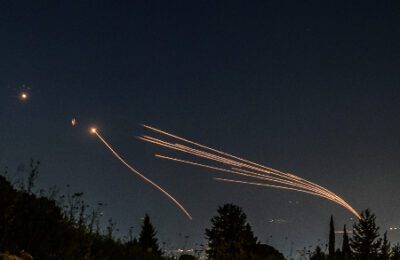You know what makes me the saddest about the terrorist invasion at Congregation Beth Israel this past Shabbat in Colleyville, Texas?
Clearly, there are many sad — or rather infuriating and terrifying — facets to yet another shul attack, that we as a people are processing in the aftermath of this harrowing and terrifying 11-hour stand-off.
Primarily, there’s sadness at feeling unsafe as a Jew and that our inner sanctuary was breached and violated. To be sure, there’s genuine fear, to pray in my house of worship, in shul. As Rabbi Cytron-Walker said, he heard the click of the gun as his back was turned “because we face towards Jerusalem when we pray.” There’s sadness and anxiety, that as we face Jerusalem to pray, clicks of a gun can go off behind our backs.
It makes us all pause, and wonder and ask the hard question: This is what America is coming to? The goldene medina of our grandparents and great-grandparents, who escaped persecution only to plant new lives of freedom of religion, here on this American soil, with a sigh of relief, to have been granted what was perceived as a final, peaceful place to pause until the coming of the Messiah. The solidarity of fellow Americans was touching, yet the fear remains real.
Each morning we recite the “birchat hashachar,” the morning prayer blessings, with which we launch our day. One of them is “Blessed are thou . . . for releasing captives.”
Operation Entebbe and the Munich Massacre were from the generation prior to mine, let alone the famous Jewish captivity of the Maharam of Rothenburg of the Middle Ages. By the time of my generation, this morning blessing was interpreted in more the vein of philosophical or emotional interpretations, rather than in a literal sense, such as gratitude for release from being captive to a destructive habit or idea.
But this past Shabbat four Jews were physically taken hostage, were actual captives, in the literal sense of the word. Although I was not captive in Colleyville, reciting those words on Sunday morning, ”. . .who releases captives,” felt different. For it was My People who were attacked and captive, in shul, for being Jewish, and no more.
What struck me with particular sadness in this harrowing story is a detail that is the genesis of it.
There was a knock on the synagogue window and Rabbi Charlie Cytron-Walker answered the knock by this stranger. The rabbi, concerned this stranger needed shelter, opened the shul door for him, and busied himself with making him tea and talking to him and taking an interest. An act of caring, kindness and dignity to a complete stranger.
I always harbor a feeling that kindness can abort a mission of malevolence, that even one act of kindness can alter the trajectory of someone wanting to execute damage in this world. I still believe in living a life of acts of kindness, of noticing others and their struggles. But I feel so very sad, that Rabbi Cytron-Walker’s compassionate gesture of preparing tea for this complete stranger, didn’t cause the now-we-know terrorist to pause and suspend his evil plans.
The Talmud shares a story of the daughter of Rabbi Akiva on her wedding night. Rabbi Akiva had been informed by astrologers that on the night his daughter will be a bride, a snake will bite her and she will die. On the night of her wedding, Rabbi Akiva’s daughter removed a brooch and stuck it into the wall behind her. The following morning, upon reaching for her brooch, a dead snake came trailing with it. Her pin had penetrated the eye of the serpent, thereby saving her life.
Rabbi Akiva asks his daughter, was there anything special you did last night? To which, she replied, “There was a poor man who arrived at the hall, but everyone was too busy with the wedding celebrations to help him, so I took my plate of food and gave it to him.” Rabbi Akiva attributed this act of kindness to have averted the death decree, the astrologers had foreseen for her
None of us knows the power of an act of kindness, nor can the worth of our actions ever be calculated in terms of the eternal, mysterious question of theodicy: why bad things happen to good people.
Yet when I heard this tea vignette — even before I watched the moving interview with Rabbi Cytron-Walker whose grace, calmness and compassion was on full display, after reflecting on the sadness of a human being reaching so depraved a place that his humanity couldn’t be altered even after a stranger prepared them a cup of tea— it’s the Talmudic story of Rabbi Akiva and his daughter that echoed in my mind.
While unfortunately, the act of kindness of Rabbi Cytron-Walker’s cup of tea did not alter the terrorist’s trajectory, perhaps, like Rabbi Akiva’s daughter who gave the person who entered her plate of food that is correlated to having her life saved by stabbing the serpent behind her in the wall, it’s Rabbi Cytron-Walker’s act of kindness in answering the knock of a stranger he let enter into his shul, his hand extended in the kindness of a cup of tea, that saved him and his fellow congregants from certain death and enabled them all to escape with their life.
Rationally, one might say, had the stranger not been let in in the first place, no danger would have been posed. But mysterious are the ways of G-d, and if Rabbi Cytron-Walker and his congregants’ destiny was to come under attack, it would have manifested in a different form. That cup of tea, might just be the game changer in this story.
We shall never know. It will remain the secret of the universe. In the meantime, we will continue to live lives of acts of kindness, not for any utilitarian purpose, but for its own sake.
And yet.
And there’s Jerusalem. “Because we face towards Jerusalem when we pray.”
For all of us Jews, our eye is on Jerusalem.
I hope Rabbi Cytron-Walker and his congregation find healing. I hope we can all pray toward Jerusalem in shul, without hearing the bone chilling click of a gun.
I hope we can all find safe ways to extend our hands in kindness and continue to pour hot cups of tea for strangers.
Copyright © 2022 by the Intermountiain Jewish News












